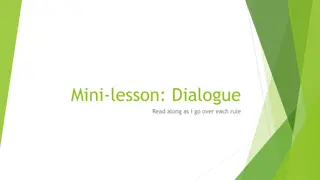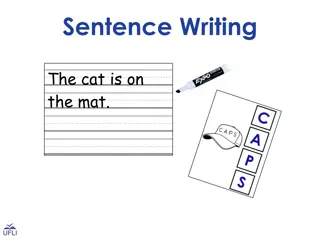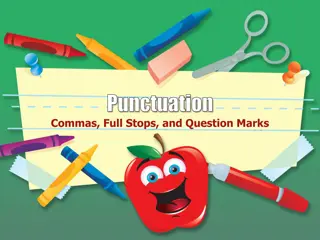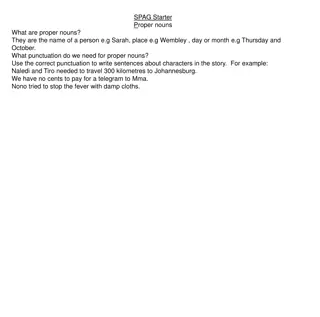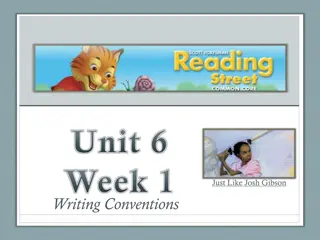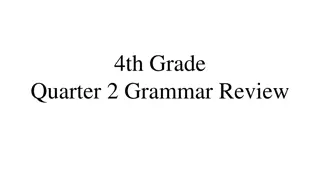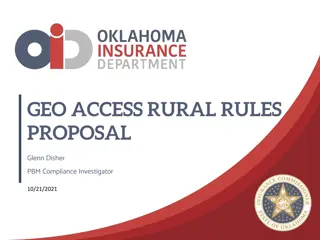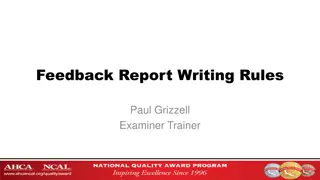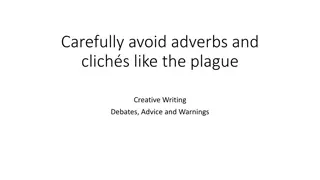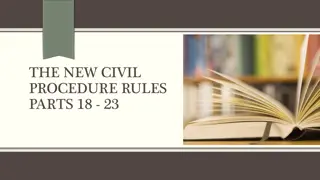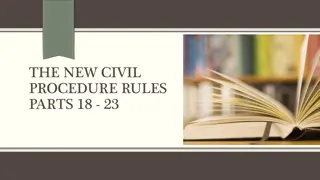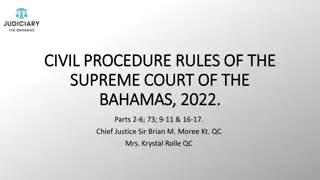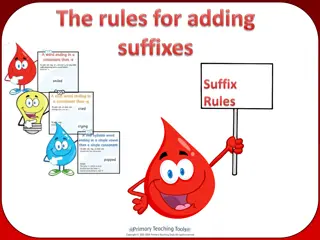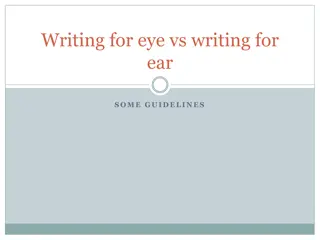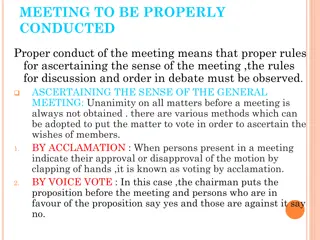Rules of Proper Capitalization and Italics in Writing
Learn the rules of proper capitalization and italics based on the guidelines provided in "Real Good Grammar, Too" by Mamie Webb Hixon. Understand when to capitalize major words in a title, the first word in direct quotations, brand and trade names, personal names, titles with proper nouns, titles denoting high rank, and more. Explore examples and guidelines for effectively applying these rules in your writing.
Download Presentation

Please find below an Image/Link to download the presentation.
The content on the website is provided AS IS for your information and personal use only. It may not be sold, licensed, or shared on other websites without obtaining consent from the author. Download presentation by click this link. If you encounter any issues during the download, it is possible that the publisher has removed the file from their server.
E N D
Presentation Transcript
Capitalization, Italicization, Quotations, and Hyphenation Adapted from Real Good Grammar, Too by Mamie Webb Hixon
Capitalization Capitalize all major words in a title. Do not capitalize articles, conjunctions, or prepositions: The Hound of the Baskervilles Song of the Open Road Leaves of Grass
Capitalization Capitalize the first word in a complete sentence in direct quotation: Socrates advises, Know thyself. Do not capitalize the first word in a direct quotation that is only part of a sentence: Despite his medical degree, the locals considered Dr. Williams a snake oil salesman.
Capitalization Capitalize brand and trade names: Ford truck Kleenex Post-It Amazon Prime
Capitalization Capitalize personal names: Ms. Williams Bertrand Russel LeBron James Nina Simone Capitalize stage names: Professor Marvel Bill Nye the Science Guy
Capitalization Capitalize titles with proper names: Professor Hood Doctor Ferguson Representative Janet Cruz
Capitalize titles that denote high rank: She will soon be President of the United States. Do not capitalize titles of ordinary positions: She is president of her school s drama club.
Capitalization Capitalize abbreviations, initialisms, and certain acronyms: Ph.D or PhD IRS NFL NASA
Capitalization Capitalize Proper Nouns: University of West Florida Booker T. Washington High School Capitalize political, social, athletic, and other groups: The League of Women Voters The Social Security Administration The New England Patriots
Capitalization Capitalize the names of specific academic courses: Black Women Writers Symbolic Logic Chemistry I Composition 102 Do not capitalize general descriptions of courses: a history course my math class the science requirement a seminar in literature
Capitalization Capitalize specific time periods, holidays, and events: the High Middle Ages St. Valentine s Day Hangout Fest Yom Kippur Capitalize the names of states, countries, and continents: Florida Walton County Mexico Asia Capitalize the names of races, nationalities, and species: African-American Puerto Rican Homo Sapien
Capitalization Capitalize compass directions when they refer to regions: the Deep South the Southeast the Middle East Do not capitalize compass directions when they refer to directions of travel: I live south of the flood zone. Continue driving north 500 feet.
Capitalization Capitalize religions and specific religious terms: Islam Southern Methodist Hindu deities Buddhist practice the Ten Commandments Do not capitalize religious terms that do not refer to something specific: my church communion agnostic or atheist (these are ways of thinking, not religions)
Capitalization Capitalize God or Allah when referencing the God of monotheism (a specific God that people often address directly as God as if it were a proper name): Then sings my soul, my savior God to thee. In sh All h Do not capitalize the word god when referencing gods who are not directly addressed as God : The gods of war all the gods of Greece and Rome
Italicization Italicize the titles for longer works: books such as The Elements of Style novels such as The Graveyard Book plays such as Angels in America newspapers such as The Boston Globe magazines such as Time paintings such as Guernica sculptures such as Bird in Space trains such as City of New Orleans ships such as USS Jimmy Carter TV programs such as Grantchester
Quotation Marks Use quotation marks for smaller works: TV episodes such as Pretty Much Dead Already, The Walking Dead movie scenes such as Stoning, The Life of Brian book chapters such as The Piper at the Gates of Dawn, The Wind in the Willows songs such as While My Guitar Gently Weeps poems such as A Sea Dirge essays such as A Modest Proposal speeches such as The Audacity of Hope
Quotation Marks Use quotation marks for direct quotations: The Munchkins tell Dorothy, Follow the Yellow Brick Road. Oscar Wilde lamented that he was fining it harder and harder to live up to [his] blue china.
Quotation Marks Place commas and periods (the small punctuation marks) inside quotation marks: Parting is such sweet sorrow, Juliet responds. Place semicolons and colons (the tall punctuation marks) outside quotation marks: The sign on the women s room door says, men s room, but the arrow points to the other rest room door.
Quotation Marks Question marks and exclamation points go inside the quotation marks if they are part of the quotation; if they are part of a sentence that ends in a quotation, they go outside the quotation marks: Was it Patrick Henry who said Give me liberty or give me death ? Dean Martin once asked, Ain t love a kick in the head?
Hyphenation Use a hyphen for fractions used as modifiers: one-third voter turnout Use a hyphen for numbers from twenty-one to ninety-nine. Use a hyphen for some compound nouns: brother-in-law Jack-in-the-box dry-cleaning
Hyphenation Use a hyphen for compound modifiers: Trent is an African-American man. A hyphen combines the words African and American to form a single adjective that describes the noun man, but Trent is an African American. The word African is an adjective that describes the noun American ; don t use a hyphen to combine them because they are different parts of speech.
Hyphenation Use a hyphen for some prefixes: well- self- all- ex- Do not use a hyphen for the following prefixes: pre un re inter non multi bi semi up over intra


